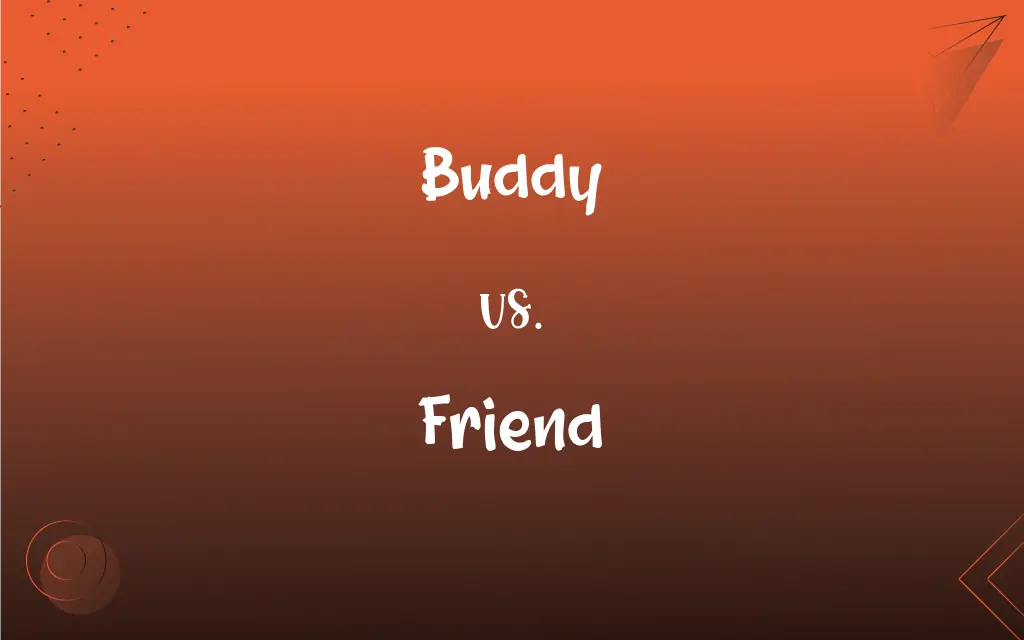Buddy vs. Friend: What's the Difference?
Edited by Harlon Moss || By Janet White || Published on November 13, 2023
"Buddy" is often used colloquially to refer to a companion or casual acquaintance, while "friend" denotes a person with whom one has a bond of mutual affection, typically exclusive of sexual or family relations.

Key Differences
"Buddy" implies a casual, friendly relationship, perhaps without deep emotional ties, often used in informal settings or as a friendly term of address. On the other hand, "friend" suggests a deeper, more enduring relationship characterized by mutual respect, affection, and understanding.
"Buddy" can be used to refer to strangers in a friendly manner, especially in American English, indicating a level of camaraderie without an established relationship. "Friend," however, implies a certain level of intimacy and understanding, built over time and experiences shared.
"Buddy" is versatile in usage, applicable in casual acquaintances or even towards animals (like a dog). In contrast, "friend" typically refers to humans and suggests a reciprocal emotional bond, extending beyond mere acquaintance.
"Buddy" often conveys a masculine connotation, commonly used between men, whereas "friend" is neutral and applies to any gender, age, or social group.
While both "buddy" and "friend" indicate a form of companionship, "buddy" can be perceived as less formal or serious, used in transient social situations or for temporary companionship; "friend" indicates a more stable, ongoing relationship with emotional investment.
ADVERTISEMENT
Comparison Chart
Formality
Informal, casual
Can be formal or informal
Depth of Relationship
Often superficial or temporary
Implies deeper emotional connection
Usage Context
Colloquial, can be used for strangers/animals
Human relationships, known individuals
Gender Connotation
Often masculine
Gender-neutral
Emotional Investment
Generally minimal
Often significant
ADVERTISEMENT
Buddy and Friend Definitions
Buddy
"Buddy is a term for a companion."
Hey buddy, glad you could join us!
Friend
"Friend implies an emotional connection."
I confide in my friend.
Buddy
"Buddy can be a friendly term of address."
Thanks for the help, buddy!
Friend
"Friend indicates a stable, ongoing relationship."
We've been friends for years.
Buddy
"Buddy may imply a lack of deep emotional connection."
We're just workout buddies.
Friend
A person whom one knows, likes, and trusts.
Buddy
"Buddy is often used in a masculine context."
He's my fishing buddy.
Friend
(Informal) To add (someone) as a friend on a social networking website.
Buddy
"Buddy can refer to a casual acquaintance."
I ran into an old buddy from high school.
Friend
A relative, a relation by blood or marriage.
Friends agree best at a distance.
Make friends of framet folk.
Buddy
A good friend; a comrade.
Friend
To act as a friend to, to befriend; to be friendly to, to help.
Buddy
A partner, especially one of a pair or team associated under the buddy system.
Friend
(transitive) To add (a person) to a list of friends on a social networking site; to officially designate (someone) as a friend.
Buddy
Friend or comrade; chum. Used as a form of familiar address, especially for a man or boy
Watch it, buddy.
Friend
One who entertains for another such sentiments of esteem, respect, and affection that he seeks his society and welfare; a wellwisher; an intimate associate; sometimes, an attendant.
Want gives to know the flatterer from the friend.
A friend that sticketh closer than a brother.
Buddy
To associate as a buddy or buddies
Buddied around with the older guys.
Friend
"Friend refers to someone with a mutual bond."
She's my closest friend.
Buddy
A friend or casual acquaintance.
They have been buddies since they were in school.
Friend
"Friend is used for relationships with emotional depth."
A good friend knows your strengths and weaknesses.
Buddy
A partner for a particular activity.
Drinking buddies
Friend
A person whom one knows; an acquaintance.
Buddy
An informal and friendly address to a stranger; a friendly (or occasionally antagonistic) placeholder name for a person one does not know.
Hey, buddy, I think you dropped this.
Friend
A person with whom one is allied in a struggle or cause; a comrade.
Buddy
(In Maritime English) A person far removed from the conversation.
I found some earphones in the pocket, buddy must have been pissed.
Buddy's loaded. 'Got like three houses.
Friend
One who supports, sympathizes with, or patronizes a group, cause, or movement
Friends of the clean air movement.
Buddy
(transitive) To assign a buddy, or partner, to.
Friend
Friend A member of the Society of Friends; a Quaker.
Buddy
Resembling a bud.
Friend
(Archaic) To befriend.
Buddy
A close friend who accompanies his buddies in their activities
Friend
A person, typically someone other than a family member, spouse or lover, whose company one enjoys and towards whom one feels affection.
John and I have been friends ever since we were roommates at college.
Trust is important between friends.
I used to find it hard to make friends when I was shy.
We became friends in the war and remain friends to this day.
We were friends with some girls from the other school and stayed friends with them.
Friend
An associate who provides assistance.
The Automobile Association is every motorist's friend.
The police is every law-abiding citizen's friend.
Friend
A person with whom one is vaguely or indirectly acquainted.
A friend of a friend;
I added him as a friend on Facebook, but I hardly know
Friend
A person who backs or supports something.
I’m not a friend of cheap wine.
Friend
(informal) An object or idea that can be used for good.
Fruit is your friend.
Friend
Used as a form of address when warning someone.
You’d better watch it, friend.
Friend
(object-oriented programming) A function or class granted special access to the private and protected members of another class.
Friend
(climbing) A spring-loaded camming device.
Friend
(euphemistic) A lover; a boyfriend or girlfriend.
Friend
One not inimical or hostile; one not a foe or enemy; also, one of the same nation, party, kin, etc., whose friendly feelings may be assumed. The word is some times used as a term of friendly address.
Friend, how camest thou in hither?
Friend
One who looks propitiously on a cause, an institution, a project, and the like; a favorer; a promoter; as, a friend to commerce, to poetry, to an institution.
Friend
One of a religious sect characterized by disuse of outward rites and an ordained ministry, by simplicity of dress and speech, and esp. by opposition to war and a desire to live at peace with all men. They are popularly called Quakers.
America was first visited by Friends in 1656.
Friend
A paramour of either sex.
Friend
To act as the friend of; to favor; to countenance; to befriend.
Fortune friends the bold.
Friend
A person you know well and regard with affection and trust;
He was my best friend at the university
Friend
An associate who provides assistance;
He's a good ally in fight
They were friends of the workers
Friend
A person with whom you are acquainted;
I have trouble remembering the names of all my acquaintances
We are friends of the family
Friend
A person who backs a politician or a team etc.;
All their supporters came out for the game
They are friends of the library
Friend
A member of the Religious Society of Friends founded by George Fox (the Friends have never called themselves Quakers)
Friend
"Friend is a term applicable to any gender."
He introduced me to his friend Susan.
FAQs
What's a "buddy"?
A "buddy" is a companion or friend, often used casually or informally.
Can anyone be a "friend"?
Friendship typically develops over time and requires a mutual sense of trust and affection.
Is "buddy" a formal term?
No, "buddy" is informal and used in casual conversation or friendly address.
What defines a "friend"?
A "friend" is someone you have a bond with, characterized by affection, respect, and mutual support.
Can a "buddy" be someone I just met?
Yes, "buddy" can be used casually, even for new acquaintances or to address someone friendly.
Can "friend" be used formally?
Yes, "friend" can be used in both formal and informal contexts.
Is a "buddy" necessarily a close relationship?
Not always; "buddy" can refer to varying degrees of acquaintanceship.
Can I call an animal a "friend"?
Yes, people often refer to pets or loyal animals as "friends."
Is it appropriate to refer to a colleague as a "friend"?
If you share a bond beyond professional duties, yes.
Do I have to know someone well to be a "friend"?
Generally, yes; "friend" implies a certain level of understanding and emotional connection.
Can "buddy" be used for animals?
Yes, it's common to refer to pets as "buddy" in a fond manner.
Is there an age limit to using "buddy"?
No, "buddy" is age-neutral but is informal.
Are the terms "buddy" and "friend" interchangeable?
Context matters; "buddy" is more casual, while "friend" implies a deeper relationship.
Is "buddy" gender-specific?
It's often used between men, but it can be used for any gender in a casual sense.
Can a "buddy" become a "friend"?
Yes, relationships can evolve, and a casual "buddy" can become a closer "friend."
Does "friend" imply a certain gender?
No, "friend" is gender-neutral.
Can "buddy" indicate a long-term relationship?
It can, but it's often used more casually.
Can "friend" refer to any age group?
Yes, "friend" is appropriate for all ages.
Can "buddy" be used in professional settings?
It's informal, so it might not be suitable for all professional settings.
Does having a "friend" mean a long-term relationship?
Often, yes; friendships usually involve ongoing, enduring connections.
About Author
Written by
Janet WhiteJanet White has been an esteemed writer and blogger for Difference Wiki. Holding a Master's degree in Science and Medical Journalism from the prestigious Boston University, she has consistently demonstrated her expertise and passion for her field. When she's not immersed in her work, Janet relishes her time exercising, delving into a good book, and cherishing moments with friends and family.
Edited by
Harlon MossHarlon is a seasoned quality moderator and accomplished content writer for Difference Wiki. An alumnus of the prestigious University of California, he earned his degree in Computer Science. Leveraging his academic background, Harlon brings a meticulous and informed perspective to his work, ensuring content accuracy and excellence.






































































